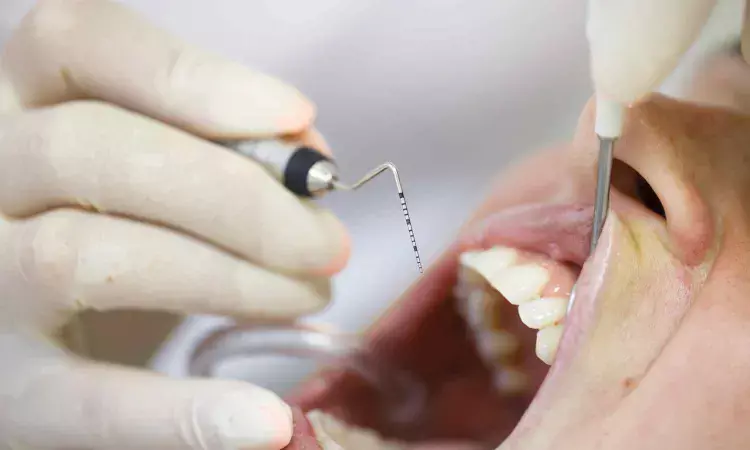- Home
- Medical news & Guidelines
- Anesthesiology
- Cardiology and CTVS
- Critical Care
- Dentistry
- Dermatology
- Diabetes and Endocrinology
- ENT
- Gastroenterology
- Medicine
- Nephrology
- Neurology
- Obstretics-Gynaecology
- Oncology
- Ophthalmology
- Orthopaedics
- Pediatrics-Neonatology
- Psychiatry
- Pulmonology
- Radiology
- Surgery
- Urology
- Laboratory Medicine
- Diet
- Nursing
- Paramedical
- Physiotherapy
- Health news
- Fact Check
- Bone Health Fact Check
- Brain Health Fact Check
- Cancer Related Fact Check
- Child Care Fact Check
- Dental and oral health fact check
- Diabetes and metabolic health fact check
- Diet and Nutrition Fact Check
- Eye and ENT Care Fact Check
- Fitness fact check
- Gut health fact check
- Heart health fact check
- Kidney health fact check
- Medical education fact check
- Men's health fact check
- Respiratory fact check
- Skin and hair care fact check
- Vaccine and Immunization fact check
- Women's health fact check
- AYUSH
- State News
- Andaman and Nicobar Islands
- Andhra Pradesh
- Arunachal Pradesh
- Assam
- Bihar
- Chandigarh
- Chattisgarh
- Dadra and Nagar Haveli
- Daman and Diu
- Delhi
- Goa
- Gujarat
- Haryana
- Himachal Pradesh
- Jammu & Kashmir
- Jharkhand
- Karnataka
- Kerala
- Ladakh
- Lakshadweep
- Madhya Pradesh
- Maharashtra
- Manipur
- Meghalaya
- Mizoram
- Nagaland
- Odisha
- Puducherry
- Punjab
- Rajasthan
- Sikkim
- Tamil Nadu
- Telangana
- Tripura
- Uttar Pradesh
- Uttrakhand
- West Bengal
- Medical Education
- Industry
Study Links Molar Incisor Hypomineralization to Increased Risk of Periodontitis in Adolescents

Brazil: A recent population-based study has revealed a concerning link between Molar Incisor Hypomineralization (MIH) and an increased risk of periodontitis in adolescents. The study, published in the Journal of Clinical Periodontology, found that adolescents with MIH were significantly more likely to develop periodontitis compared to their peers without MIH, highlighting the potential for early intervention.
Molar Incisor Hypomineralization, a developmental condition characterized by hypomineralization of the first permanent molars and incisors, has been linked to various dental issues. However, its potential impact on periodontal health, particularly in adolescents, has not been extensively studied until now. Periodontitis, an inflammatory condition that affects the supporting structures of the teeth, is a major concern, as it can lead to tooth loss if left untreated.
Against the above background, Cecilia Claudia Costa Ribeiro, Department of Dentistry II, Federal University of Maranhão (UFMA), São Luis, Maranhão, Brazil, and colleagues aimed to explore the relationship between molar incisor hypomineralization and periodontitis in adolescents.
For this purpose, the researchers conducted a population-based study of Brazilian adolescents aged 18 and 19 years (n=2515) to assess the association between MIH and periodontitis. MIH was evaluated using Ghanim's criteria. Periodontitis indicators, including bleeding on probing (BoP), probing pocket depth (PPD ≥4 mm), and clinical attachment level (CAL ≥3 mm), were used to estimate a continuous latent variable for periodontitis.
The researchers applied structural equation modeling, adjusting for socioeconomic status, sex, smoking, triglycerides/high-density lipoprotein (TG/HDL), and visible plaque index. Sensitivity analyses included logistic regression to assess MIH’s effect on periodontitis at the individual level and multilevel regression to examine MIH’s impact on CAL and PPD at the tooth level.
The study revealed the following findings:
- The prevalence of MIH in the study was 16.86% (n=423).
- Individuals with MIH showed higher values for Periodontitis Indicators through a direct pathway (standardized coefficient [SC] = 0.193) and indirectly mediated by biofilm (SC = 0.263).
- MIH was also associated with periodontitis according to CDC-AAP criteria (SC = 0.071), with an indirect mediation effect through biofilm (SC = 0.344).
- Lower socioeconomic status, sex, TG/HDL levels, and biofilm were consistently linked to both periodontal outcomes.
- Tooth-level sensitivity regression analysis confirmed the association observed in the individual-level analyses.
"The study highlights the need for heightened awareness and proactive management of periodontal health in adolescents with MIH. With early detection and appropriate care, the risk of developing periodontitis can be mitigated, helping to preserve the long-term dental health of these individuals," the researchers concluded.
Reference:
Pereira Franco, M. M., Costa Ribeiro, C. C., Costa Ladeira, L. L., Brondani, M. A., Abreu Fonseca Thomaz, E. B., & Coelho Alves, C. M. Molar Incisor Hypomineralization and Periodontitis in Adolescents: A Population-Based Study. Journal of Clinical Periodontology. https://doi.org/10.1111/jcpe.14123
Dr Kamal Kant Kohli-MBBS, DTCD- a chest specialist with more than 30 years of practice and a flair for writing clinical articles, Dr Kamal Kant Kohli joined Medical Dialogues as a Chief Editor of Medical News. Besides writing articles, as an editor, he proofreads and verifies all the medical content published on Medical Dialogues including those coming from journals, studies,medical conferences,guidelines etc. Email: drkohli@medicaldialogues.in. Contact no. 011-43720751


